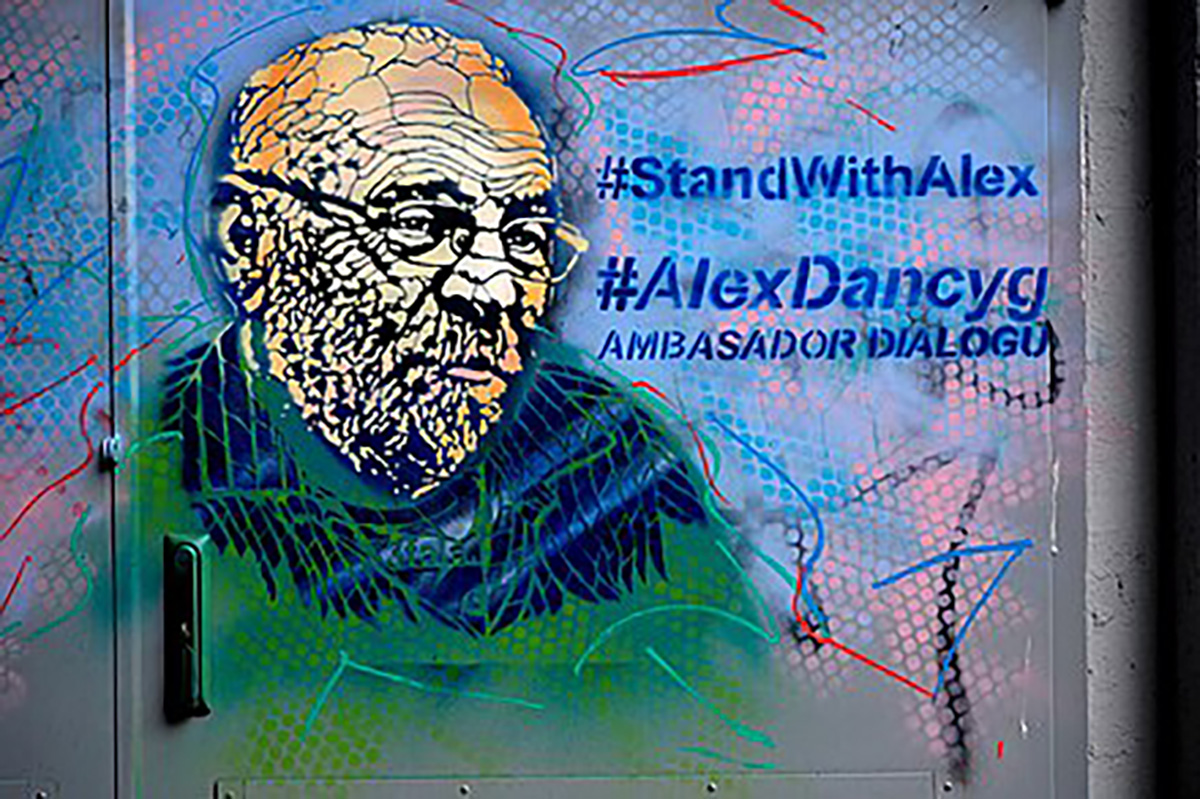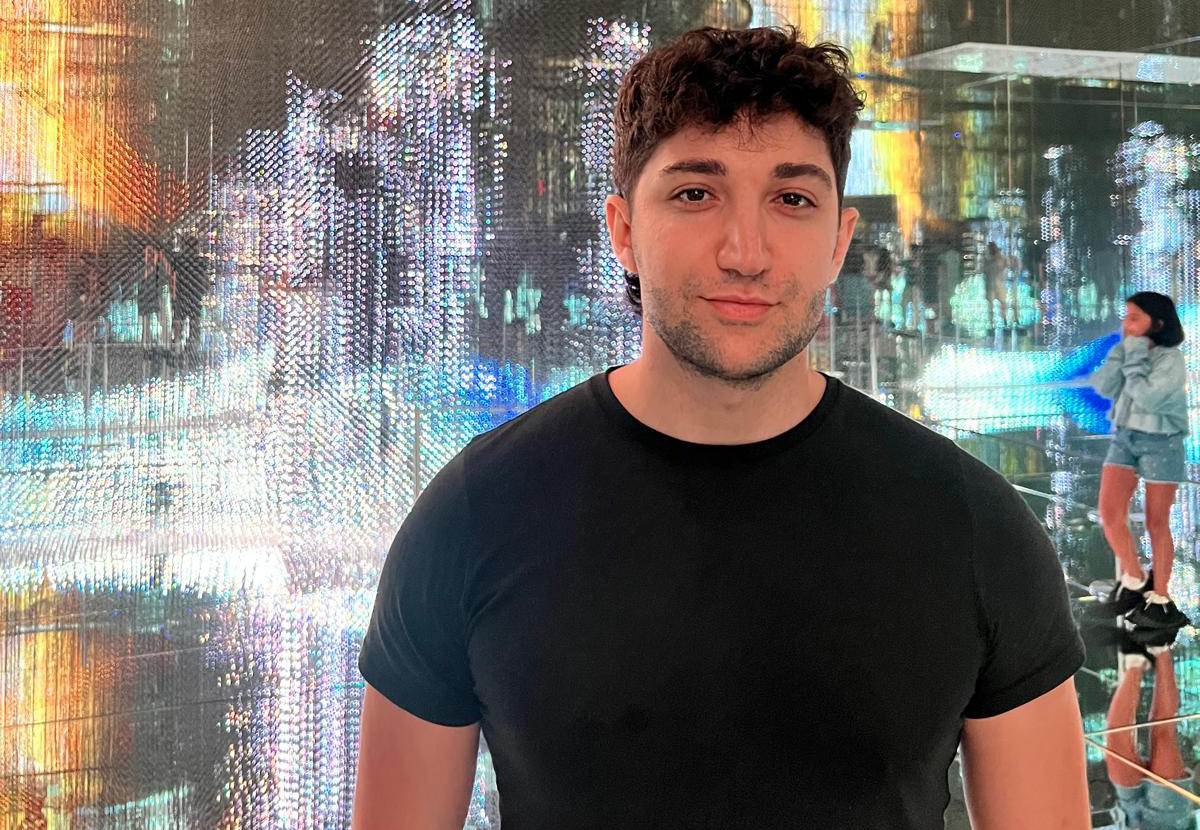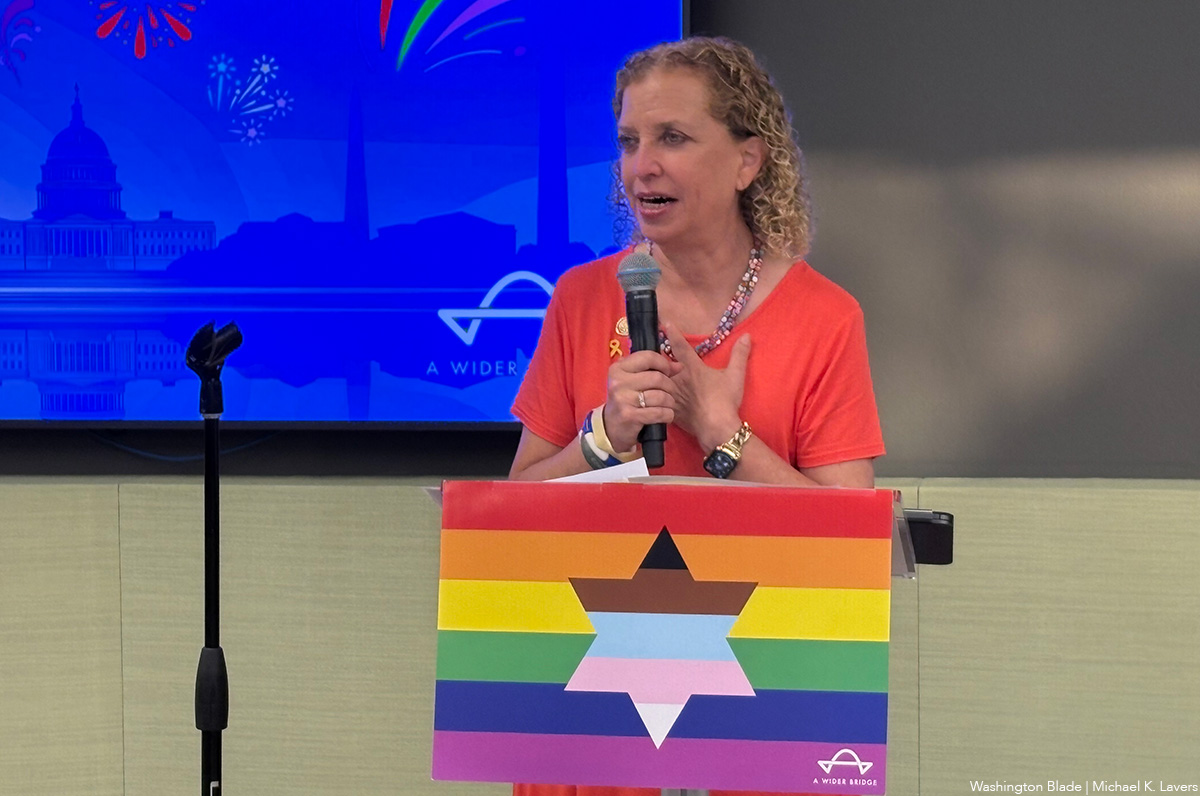Israel
LGBTQ Israelis struggle with Oct. 7 aftermath
Groups coordinating mental health services, donations for displaced families

Editor’s note: International News Editor Michael K. Lavers was on assignment in Israel from Oct. 4-14.
JERUSALEM — LGBTQ Israelis and the groups that advocate for their rights continue to struggle with the aftermath of Oct. 7.
Hadas Kerem Bloemendal is the chair of Jerusalem Open House for Pride and Tolerance, a group that organizes the city’s annual Pride parade. The therapist and former Israel Defense Forces intelligence officer who is raising twins with her wife spoke with the Washington Blade on Oct. 8 at Jerusalem Open House’s offices that are located near the city’s Zion Square.
Bloemendal said she and her colleagues in the days after Oct. 7 realized a lot of LGBTQ Israelis would not ask for help “from regular hotlines because they are afraid that the people that will answer will not be gay-friendly enough or will not understand the complexity of what they are going through.”
She told the Blade a closeted man in a message he posted to an online bulletin board said he is “really afraid because his boyfriend was kidnapped, and he can’t tell anyone because he’s gay and he’s not out, and if anyone would find out, what would they do to him.”
The man’s boyfriend is one of 251 people who Hamas militants kidnapped on Oct. 7. It remains unclear whether all of the 101 hostages who remain in the Gaza Strip are still alive.
“You can’t imagine such a thing,” said Bloemendal.
A group of gay-friendly therapists after Oct. 7 volunteered to hold virtual sessions for Jerusalem Open House. The group also created a Google spreadsheet to streamline referrals.
Bloemendal said Jerusalem Open House received more than 80 calls in the two weeks after Oct. 7.
The Jewish Federations of North America gave Jerusalem Open House funding to continue the program. Jerusalem Open House subsequently created a network of LGBTQ-friendly therapists and social workers throughout Israel who work with the transgender community, Orthodox men and women, Arab Israelis, and other groups.
“People who lost family members, people who are evacuated from their homes are getting therapy through the project,” said Bloemendal.
She added Jerusalem Open House also works with IDF reservists, “people who were hurt during this war,” and “people who were already in a very fragile state before the war started.”
“When you are a fragile population, war only makes it worse,” said Bloemendal.

Yam Bahar is a spokesperson for Pride House of Be’er Sheva in Be’er Sheva, which is southern Israel’s largest city. The freelance photographer and editor who also manages a local bar spoke with the Blade on Oct. 9.
A Bedouin man three days earlier killed an Israel Border Police officer and injured 10 others when he attacked Be’er Sheva’s main bus station. It is less than a mile from Pride House of Be’er Sheva.


Pride House of Be’er Sheva, like Jerusalem Open House, offered psychological support to the local community after Oct. 7. Pride House of Be’er Sheva also started a “hamal” or “war room” in Hebrew that coordinated donations of food and children’s toys to displaced families.
“It was important for the community here to do this,” Bahar told the Blade.
Pride House of Be’er Sheva also distributes food on holidays.
“We’re trying to make this a place that can address real problems of people who are here,” said Bahar.
The Aguda, the Association for LGBTQ Equality in Israel, after Oct. 7 worked with other advocacy groups to host displaced people. The Aguda also made care packages for IDF soldiers, and offered mental health services.
“We did our best,” Aguda CEO Yael Sinai Biblash told the Blade on Oct. 8. “LGBTQ people in Israel are vulnerable, and once we’re at war they are more vulnerable.”
“They need more help,” she added.
Hamas militants on Oct. 8, 2023, killed IDF Maj. Sagi Golan in Be’eri, a kibbutz that is near the Israel-Gaza border. His fiancé, Omer Ohana, with the support of the Aguda and other advocacy groups, successfully lobbied Israeli lawmakers to amend the country’s Bereaved Families Law to recognize LGBTQ widows and widowers of fallen servicemembers.
Biblash is among the hundreds of people who attended Golan’s memorial service that took place at a community in the Tel Aviv suburb of Herzliya on Oct. 8. Biblash spoke with the Blade after it ended.
“It was a big effort and a big success,” she said, referring to the campaign to change the Bereaved Families Law.
Oct. 7 has left LGBTQ Palestinians even more vulnerable, isolated
The activists with whom the Blade spoke readily acknowledged Oct. 7 and its aftermath have particularly harmed LGBTQ Palestinians.
Bloemendal noted Jerusalem Open House works with people from the West Bank, Israeli settlements, and Arab cities throughout the region.
“It’s about whether you can come here,” she said. “Once you come here, we don’t care where you come from.”
The Tel Aviv Court for Administrative Affairs in February ruled LGBTQ Palestinians can request asylum in Israel based on persecution they suffer in their homeland because of their sexual orientation or gender identity. Bloemendal noted the additional restrictions on travel from the West Bank that Israel implemented after Oct. 7 has left LGBTQ Palestinians even more vulnerable and isolated.
“Some of them could come and go before, but … everything is more closed now because they (Israeli authorities) are afraid of suicide bombs and things like that,” she said. “It’s much harder to leave home, so you don’t even have your one time a week getting out to Jerusalem and having your LGBTQ experience.”
Neesha Gagement of the Israeli Transgender Association, a group that works with Palestinian trans sex workers in Jaffa, spoke with the Blade on Oct. 13 at her office in Tel Aviv’s Neve Sha’anan neighborhood.
She said many of the sex workers with whom she and her colleagues work faced discrimination, harassment, and other challenges before Oct. 7 — and some chose “a very Israeli name” and did not “speak out” as a result. Gagement told the Blade that many of them are now afraid of leaving their homes, have stopped using social media, and even planning to leave Israel.
“[They are] terrified of expressing their opinion,” she said.
The Israeli Transgender Association since Oct. 7 has offered virtual psychological services. Therapists in some cases will also meet clients at coffee shops close to where they live.

The Israeli government says Hamas militants on Oct. 7 killed roughly 1,200 people, including upwards of 360 partygoers at the Nova Music Festival near Re’im, a kibbutz that is a few miles southwest of Be’eri. The Hamas-controlled Gaza Health Ministry says Israeli forces have killed more than 42,000 people in the enclave since Oct. 7.
The International Criminal Court in May announced it plans to issue arrest warrants for Israeli Prime Minister Benjamin Netanyahu, Israeli Defense Minister Yoav Gallant, and three Hamas leaders — Yahya Sinwar, Mohammed Deif, and Ismail Haniyeh.
Karim Khan, the ICC’s chief prosecutor, said the five men have committed war crimes and crimes against humanity in Gaza and Israel. (A suspected Israeli airstrike on July 31 killed Haniyah while he was in the Iranian capital of Tehran to attend Iranian President Masoud Pezeshkian’s inauguration. IDF soldiers on Oct. 16 killed Sinwar in Rafah, a city in southern Gaza that borders Egypt.)
Hamas, which the U.S. and Israel have designated a terrorist organization, claimed responsibility for an Oct. 1 attack at a light rail station in Jaffa that left seven people dead and more than a dozen others injured.
Hezbollah, an Iran-backed militant group the U.S. and Israel have designated a terrorist organization, since Oct. 8, 2023, has been regularly launching rockets and missiles from Lebanon to Israel.
The Lebanese Health Ministry has said Israeli airstrikes in Beirut and elsewhere in the country in recent weeks have killed upwards of 2,500 people.
An Israeli airstrike in the Beirut suburb of Dahieh on Sept. 27 killed long-time Hezbollah Secretary-General Hassan Nasrallah. Iran on Oct. 1 launched upwards of 200 ballistic missiles at Israel in retaliation.
Hamas on the anniversary of Oct. 7 launched rockets that triggered sirens in Tel Aviv and surrounding areas. The Houthi rebels in Yemen on the same day launched missiles and drones that prompted additional warnings in central Israel. Hezbollah missiles on the anniversary of Oct. 7 also targeted an IDF base north of Tel Aviv.
Israel’s air defense system intercepted almost all of the rockets and missiles.
Hamas militants kidnapped, murdered Yad Vashem historian
Oct. 7 and the war has directly impacted several of the activists with whom the Blade spoke.
Hamas militants kidnapped Alex Dancyg, a historian at Yad Vashem, Israel’s Holocaust memorial, from his home in Nir Oz, a kibbutz that is roughly two miles from Khan Younis, a city in southern Gaza.
The militants later killed Dancyg, and the IDF on Aug. 20 recovered his body from a tunnel in Khan Younis. His wife and young twins spent upwards of 18 hours trapped in Nir Oz on Oct. 7 before the IDF rescued them.
Bloemendal became friends with Dancyg when she worked at Yad Vashem. She became emotional when she spoke about him.
“I learned a lot from him,” said Bloemendal. “We became friends.”

Bloemendal’s brother is an IDF reservist who fought Hamas militants in Gaza. His wife and their three young children left their home in Kiryat Gat, a city in southern Israel that is roughly 20 miles east of Gaza, and lived with Bloemendal’s parents and other relatives in Jerusalem for several months.
“We try to help as best as we can, but she has three kids under the age of five,” said Bloemendal. “No matter how much you help it’s not the same.”
Hezbollah rocket killed three of gay Druze man’s cousins
Ala Ibrahim, 30, is a gay Druze man who grew up Majdal Shams, a predominantly Druze community in the Golan Heights. He moved to Tel Aviv a decade ago, and works in the city’s high tech industry.
Ibrahim on July 27 was about to board a flight to Israel from Bangkok when his mother called him and told him a Hezbollah rocket had struck a soccer field in Majdal Shams.
He told the Blade on Oct. 14 during a telephone interview that he knew the rocket had killed nine children when the flight took off. Ibrahim landed at Ben-Gurion Airport 10 hours later, and heard a reporter read the names of the 12 victims on the radio while he was in a taxi.
Three of them — Johnny Wadeea Ibrahim, Guevara Ibrahim Ibrahim, and Alma Ayman Fakhr al-Din — were his cousins.
“That’s how I knew,” said Ibrahim.
He quickly returned to Majdal Shams with his cousin.
Ibrahim said the victims’ caskets were not open at their funerals “because all of them were not in a state where they could be shown.” He told the Blade that children were crying because they could no longer play with their friends.
“It was a heartbreaking day to be there,” said Ibrahim.

The Nova Music Festival was less than 30 miles from Be’er Sheba.
Former Pride House of Be’er Sheva Chair Ariella Menaker told the Blade less than a week after Oct. 7 that she received an invitation to attend one of the festival’s parties. She said she knew at least five people who had been killed.
“It’s a close-knit group,” said Menaker. “Even people you don’t know by name; you’ve partied with them; you know them. You’ve known them for years from the dance floor.”
“I keep thinking about them, trying to escape,” she added.
Bahar said “everyone knows someone” who was killed on Oct. 7.
“We can’t see the end right now,” Biblash told the Blade after Golan’s memorial service.
She lives outside of Tel Aviv with her 1-year-old child.
Biblash described the Iranian missile attack against Israel on Oct. 1 as “terrifying.” She also said her child sleeps in her home’s safe room.
“That’s crazy,” said Biblash. “That should not happen.”

A Wider Bridge on Friday announced it will shut down at the end of the month.
The group that “mobilizes the LGBTQ community to fight antisemitism and support Israel and its LGBTQ community” in a letter to supporters said financial challenges prompted the decision.
“After 15 years of building bridges between LGBTQ communities in North America and Israel, A Wider Bridge has made the difficult decision to wind down operations as of Dec. 31, 2025,” it reads.
“This decision comes after challenging financial realities despite our best efforts to secure sustainable funding. We deeply appreciate our supporters and partners who made this work possible.”
Arthur Slepian founded A Wider Bridge in 2010.
The organization in 2016 organized a reception at the National LGBTQ Task Force’s Creating Change Conference in Chicago that was to have featured to Israeli activists. More than 200 people who protested against A Wider Bridge forced the event’s cancellation.
A Wider Bridge in 2024 urged the Capital Pride Alliance and other Pride organizers to ensure Jewish people can safely participate in their events in response to an increase in antisemitic attacks after Hamas militants attacked Israel on Oct. 7, 2023.
The Jewish Telegraphic Agency reported authorities in Vermont late last year charged Ethan Felson, who was A Wider Bridge’s then-executive director, with lewd and lascivious conduct after alleged sexual misconduct against a museum employee. Rabbi Denise Eger succeeded Felson as A Wider Bridge’s interim executive director.
A Wider Bridge in June honored U.S. Rep. Debbie Wasserman Schultz (D-Fla.) at its Pride event that took place at the Capital Jewish Museum in D.C. The event took place 15 days after a gunman killed two Israeli Embassy employees — Yaron Lischinsky and Sarah Milgrim — as they were leaving an event at the museum.
“Though we are winding down, this is not a time to back down. We recognize the deep importance of our mission and work amid attacks on Jewish people and LGBTQ people – and LGBTQ Jews at the intersection,” said A Wider Bridge in its letter. “Our board members remain committed to showing up in their individual capacities to represent queer Jews across diverse spaces — and we know our partners and supporters will continue to do the same.”
Editor’s note: Washington Blade International News Editor Michael K. Lavers traveled to Israel and Palestine with A Wider Bridge in 2016.
District of Columbia
Bet Mishpachah welcomes release of last hostages from Gaza
President Donald Trump helped broker ceasefire between Israel, Hamas

Bet Mishpachah on Monday welcomed the release of the remaining hostages in the Gaza Strip as part of a ceasefire agreement that President Donald Trump helped broker.
“As we enter into the holy days of Shmini Atzeret and Simhat Torah, we are flooded with a mix of emotions,” said Jake Singer-Beilin, the Washington LGBTQ Jewish congregation’s chief rabbi, in a message to members. “The great joy of these holy days was smashed two years ago on Oct. 7, 2023. Hundreds were murdered on that day, and many — alive and dead — were taken hostage.”
“Today, as the last living hostages return back to Israel, we find great relief as well as pain for what has happened to them up to this point,” he added. “This year, we will celebrate with exuberance knowing that a ceasefire is holding, and that the captives have been redeemed. We will also hold within us the grief that we feel for Israelis and Palestinians who died on that day and since. With these swirling emotions, we offer thanks to the peacemakers and to the One who makes peace on high. We pray that peace will reign in the region, and that those who have endured so much will find healing and hope.”
The Israeli government says Hamas militants killed roughly 1,200 people on Oct. 7, including upwards of 360 partygoers at the Nova Music Festival near Re’im, a kibbutz that is a couple miles from the Gaza Strip, when it launched its surprise attack on the country. The militants also kidnapped more than 200 people.
(Washington Blade video by Michael K. Lavers)
The Hamas-controlled Gaza Health Ministry says Israeli forces have killed more than 67,000 people in the enclave since Oct. 7. Karim Khan, the International Criminal Court’s chief prosecutor, has said Israeli Prime Minister Benjamin Netanyahu and former Hamas leader Yahya Sinwar, who the Israel Defense Forces killed last October, are among those who have committed war crimes and crimes against humanity in Gaza and Israel.
The Israeli government has strongly denied it has committed genocide in Gaza.

The ceasefire between Israel and Hamas took effect on Oct. 10.
The last 20 living hostages returned to Israel on Monday, while the Jewish State released 1,968 Palestinians who had been in Israeli prisons. Hamas on Monday released the bodies of four hostages who died while in captivity.
Trump, Egyptian President Abdel Fattah el-Sisi, Turkish President Recep Tayyip Erdogan, and Qatari Emir Tamim bin Hamad Al Thani on Monday signed the ceasefire agreement in Sharm el-Sheikh, Egypt. Trump earlier in the day spoke at the Israeli Knesset in Jerusalem.
“This is the historic dawn of a new Middle East,” said Trump in his Knesset speech.
The ceasefire and its implementation remains tenuous, but one Israeli LGBTQ activist with whom the Washington Blade spoke on Monday celebrated the hostages’ return.
“Emotions are high and everyone is with their loved ones or celebrating in the streets,” they said. “It’s definitely a historic and joyful day for the Israeli people.”
Ga’ava, an LGBTQ group that is affiliated with the Toronto-based Center for Israel and Jewish Affairs, on its Instagram page proclaimed the “hostages are free, war is over.” A Wider Bridge — a group that “advocates for justice, counters LGBTQphobia, and fights antisemitism and other forms of hatred” — described Monday as “a joyful day.”
Israel
Activist recalls experience in Tel Aviv after Israel-Iran war began
Marty Rouse was part of Jewish Federations of North America Pride mission

A long-time activist who was in Israel last month when its war with Iran began has returned to D.C.
Marty Rouse traveled to Israel on June 6 with the Jewish Federations of North America. The 5-day mission ended the night before the annual Tel Aviv Pride parade was scheduled to take place.
Mission participants met with Israeli President Isaac Herzog and several LGBTQ activists in Tel Aviv and Jerusalem. They visited the Western Wall, the Nova Music Festival site, and Nir Oz, a kibbutz in southern Israel that is less than a mile from the country’s border with the Gaza Strip. Mission participants also visited Sderot, a city that is roughly a mile from the Hamas-controlled enclave, a veterans rehabilitation facility, a new LGBTQ health center and the Aguda: The Association for LGBTQ Equality in Israel in Tel Aviv.
Hamas militants on Oct. 7, 2023, killed upwards of 360 partygoers and kidnapped dozens more at the music festival that was taking place at a campground near Re’im, a kibbutz that is roughly 10 miles southwest of Nir Oz. The militants killed or took hostage nearly a quarter of Nir Oz’s residents. They also took control of Sderot’s police station.

Tel Aviv Deputy Mayor Chen Arieli spoke at the mission’s closing party that took place at the Sheraton Grand, a hotel that overlooks Tel Aviv’s beachfront, on June 12.
Rouse and other mission participants planned to stay in Tel Aviv for the Pride parade, which was scheduled to take place the following day. He and Gordie Nathan, another mission participant who lives in Palm Springs, Calif., had checked into a nearby hotel that was less expensive.
“We said our farewells,” recalled Rouse when he spoke with the Washington Blade in D.C. on June 24. “We went to our hotels, and we get the warning, and then all hell broke loose.”
Israel early on June 13 launched airstrikes against Iran that targeted the country’s nuclear and military facilities.
Rouse said mission organizers told him and other participants who remained in Tel Aviv to meet at the Sheraton Grand for breakfast and dinner — Israel’s airspace was closed in anticipation of an Iranian counterattack, and authorities cancelled the Pride parade.
He said he went to bomb shelters at least twice a night for three nights.
Israel’s Home Front Command during the war typically issued warnings about 10 minutes ahead of an anticipated Iranian missile attack. Sirens then sounded 90 seconds before an expected strike.
Rouse and Nathan walked to the Sheraton Grand on June 13 when the Home Front Command issued a 10-minute warning. They reached the hotel in a couple of minutes, and staff directed them to the bomb shelter.
“You know to walk slowly, everything’s fine,” recalled Rouse. “You get 10 minutes, so everything was fine when the alarm goes off.”
Rouse described the Sheraton Grand shelter as “well lit” with WiFi, a television, and air conditioning. He was watching an Israeli television station’s live coverage of the Iranian missile attack when he saw one hit an apartment building in the Tel Aviv suburb of Ramat Gan.
A 74-year-old woman died and her boyfriend was seriously injured.
“I go over to look at the TV, just to watch,” recalled Rouse. “All of a sudden, you watch, and you see one bomb go and land and explode in Tel Aviv on TV. It landed and blew up.”
“I was like, okay, this is real, and so that was scary,” he added.
Rouse said the bomb shelter in the hotel where he and Nathan were staying after the mission ended was far less comfortable.
“It was dark. It was humid. It was hot. It was very uncomfortable,” said Rouse. “You really felt alone.”

Rouse and nearly everyone else on the mission who were in Tel Aviv when the war began left Israel on June 15. They boarded buses that took them to the Jordanian capital of Amman, which is a roughly 2 1/2-hour drive from Tel Aviv through the West Bank.
Rouse described the trip as “like a field trip” until they drove across the Jordan River and arrived at the Jordanian border crossing.
“You walk into this room, and instead of being in a well air-conditioned airport, you’re in this hot, humid, small place in the middle of the desert, packed with people, and those big, large, loud fans and pictures of military people on the walls,” he said. “It was almost like a Casablanca kind of feeling.”
Rouse said Jordanian authorities brought mission participants through customs in groups of 10. A Jewish Federations of North America liaison from Amman who previously worked as a tour guide for A Wider Bridge — a group that “advocates for justice, counters LGBTQphobia, and fights antisemitism and other forms of hatred” — went “behind closed doors” to ensure everyone was able to enter the country.
“It took a really long time,” Rouse told the Blade.

Mission participants arrived in Amman a short time later. They checked into their hotel and then had dinner at a restaurant.
“Now we feel like we’re safe and we’re in Amman,” recalled Rouse. “We’re sitting outside having a beautiful dinner.”
Iranian missiles passed over Amman shortly after Rouse and the other mission participants had begun to eat their dessert. They went inside the restaurant, and waited a few minutes before they boarded busses that brought them back to their hotel.
“No one was openly freaking out, which I was surprised by,” said Rouse.
The group was scheduled to fly from Amman to Cairo at 11 p.m. local time (4 p.m. ET) on June 16. They visited Jerash, an ancient city north of Amman, before their flight left Jordan.
“[The Jerash trip] actually took our minds off of everything,” said Rouse.
A Jewish Federations of North America contact met Rouse and the other mission participants at Cairo’s airport once their flight landed. Rouse arrived at JFK Airport in New York on June 17.
Trump-announced ceasefire ended 12-day war
President Donald Trump on June 23 announced a ceasefire that ended the 12-day war.
The U.S. three days earlier launched airstrikes that struck three Iranian nuclear sites. The ceasefire took effect hours after Iran launched missiles at a U.S. military base in Qatar.
Iran said the war killed more than 900 people in the country.
The Associated Press notes Iranian missiles killed 28 people in Israel. One of them destroyed Tel Aviv’s last gay bar on June 16.
The war took place less than two years after Oct. 7.
The Israeli government says Hamas militants on Oct. 7, 2023, killed roughly 1,200 people on that day when it launched its surprise attack on the country. The militants also kidnapped more than 200 people.
The Hamas-controlled Gaza Health Ministry says Israeli forces have killed nearly 55,000 people in the enclave since Oct. 7. Karim Khan, the International Criminal Court’s chief prosecutor, has said Israeli Prime Minister Benjamin Netanyahu and former Hamas leader Yahya Sinwar, who the IDF killed last October, are among those who have committed war crimes and crimes against humanity in Gaza and Israel.

Rouse upon his return to the U.S. said he “was never as aware of the comfort of another human being than I was during that time.” Rouse affectionately called Nathan his “bomb shelter boyfriend” and even questioned the way he reacted to the missile alerts.
“He’s sitting on the edge of the bed and he goes, okay, I’m going to put on my socks and my shoes, and I say, really? You’re going to put on your socks,” Rouse told the Blade. “The fact that I was nervous, that putting on socks might have changed the direction of our lives, to me was like I can’t believe I said that to him.”
Rouse quickly added Nathan helped him remain calm.
“If I was by myself, those nights would have been long enough,” said Rouse. “It’s a totally different feeling to be with another human that you know than to be by yourself.”

Rouse also praised the Jewish Federations of North America.
“JFNA really sprung into action and started to figure out all options to get us all safely home,” said Rouse. “It was all about logistics. Staff worked around the clock identifying and then mobilizing to get us back to the states. It was a great team effort and I know I speak for everyone in expressing our deep appreciation for their dedication to getting us safely home.”
-

 Sponsored5 days ago
Sponsored5 days agoSafer Ways to Pay for Online Performances and Queer Events
-

 District of Columbia4 days ago
District of Columbia4 days agoTwo pioneering gay journalists to speak at Thursday event
-

 Colombia4 days ago
Colombia4 days agoBlade travels to Colombia after U.S. forces seize Maduro in Venezuela
-

 a&e features4 days ago
a&e features4 days agoQueer highlights of the 2026 Critics Choice Awards: Aunt Gladys, that ‘Heated Rivalry’ shoutout and more




















